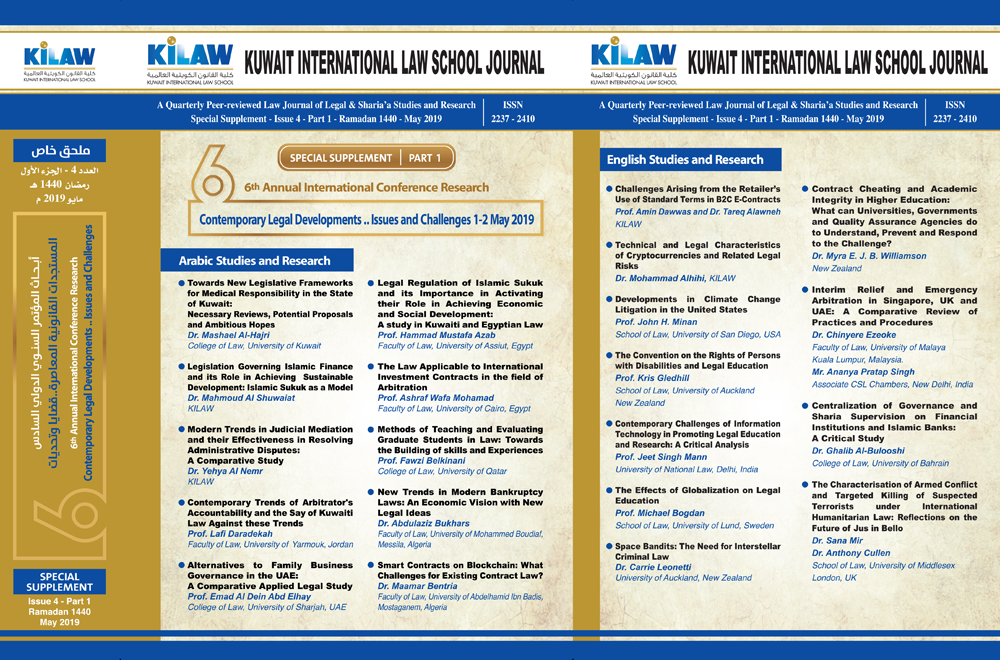Call for Papers
Contemporary Legal Developments: Issues and Challenges
Legal developments constitute a set of problems, interpretations and solutions presented by various social institutions, whether economic, legislative, academic or other, on a continuous and different basis, to regulate the new phenomena and realities witnessed by societies. Therefore, it was taken for granted that these developments will be characterized by the nature of the stages they go through, and that new interpretations always reflect the current transformations, especially considering the central role of legal and academic institutions in various fields. With this in mind, and in light of the significant and qualitative transformations that Arab and international societies are undergoing, there are several fundamental legal issues in different fields. They also pose fundamental challenges that require qualitative solutions and deliberations through academic discussions and in-depth and specialized research.
Due to the importance of these issues, and in light of KILAW’s keenness to enhance its academic and social role, KILAW has decided to organize its sixth Annual International Conference to be held on 1-2 May 2019 under the title:
“Contemporary Legal Developments: Issues and Challenges”
The School has the honor to invite legal researchers to participate in the proposed topics with research papers that would enrich the work of the conference in the discussion of these important and vital topics. Note: the School will bear the travel and accommodation expenses of researchers whose papers are accepted by the Conference’s Academic Committee.
The main themes of the conference are as follows:
First: Legal Education and Opportunities for Advancement
- The nature and trends of current and future legal education and its relation to the practical reality.
- Legal education and employment.
- The effects of globalization on legal education.
- The use of information technology in legal education.
- Curriculum reforms and evolution of teaching methodology.
- Quality standards in legal education.
Second: Recent Trends in Alternative of Dispute Resolution
- Third party funding in international commercial arbitration.
- The liability of arbitrators and arbitrations institutions.
- Arbitration and its implications on the sovereignty of the state and the fall of the concept of administrative arbitration.
- Arbitration in investment disputes.
- Emergency Arbitrators.
- The effectiveness of administrative appeals, conciliation and mediation in resolving administrative disputes.
Third: Recent Trends in International Law
- Cyberspace and international law;
- Artificial intelligence and jus in bello;
- International trade law: multilateralism under a threat?
- Nuclear weapons: between disarmament and modernization.
- Global governance: sovereignty re-invented.
- New Frontiers: International Space Law.
Fourth: Investment and Sustainable Development
- Islamic finance and investment in sustainable development.
- Law and sustainable development.
- The role of the legislation and social justice.
- Evaluating the experiences of public-private participation in the field of development.
- The role of legislation in attracting foreign direct investment.
- Legal Foreign Investment Law in the State of Kuwait: Challenges and Opportunities.
Fifth: Problems of Applying Corporate Governance, e-transactions and Competition
- Legal Challenges in applying corporate governance and its development.
- Growing needs for the development of specialized trade courts.
- Recent trends in relation to conventional and Islamic bonds (Sukuk).
- Challenges in electronic trading.
- Challenges of competition regulation and the role of relevant authorities.
Sixth: Climate Change and State Responsibility in Cases of Environmental Disasters
- Constitutional rules governing State responsibility in environmental disasters and the responsibility of the executive branch.
- The role of the legislative authority in developing a system of laws concerning environmental disasters and mechanisms of compensation.
- The role of the judiciary in cases of environmental disasters.
- The role of the civil society institutions in dealing with environmental disasters.
- Legal framework for the use of international companies specialized in dealing with environmental disasters.

